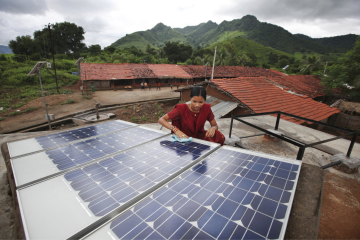Today marks the release of a new report entitled "In Search of Policy Coherence: Aligning OECD Infrastructure Advice with Sustainable Development". The Heinrich Böll Foundation commissioned IHRB to review key submissions by the Organization for Economic Cooperation and Development (OECD) to the G20 on infrastructure investment to determine whether the OECD's advice is coherent with sustainable development policies.
In their blog, "The Infrastructure We Don't Want: OECD Infrastructure Advice to the G20" report author Motoko Aizawa of IHRB with Nancy Alexander of the Heinrich Böll Foundation highlight issues and findings raised by the report.
Background
The G20 sees investment in infrastructure megaprojects, especially in the energy, transportation and water sectors, as necessary to reinvigorate economic growth and advance job creation and development. There is no question that infrastructure development is crucial; it acts as a gateway to natural resources and markets, powers industry, and provides key services to citizens around the world.
Message
IHRB found that the OECD's advice to the G20's powerful "finance track" is out of sync with recent achievements of the global community, such as the new UN Sustainable Development Goals (SDGs) that embrace infrastructure as an important pathway to sustainable development. The G20 finance track consists of finance ministers and central bank governors of the G20 countries.
The G20 assigns issues related to sustainable development to the less influential part of the G20. The existence of silos within both "governance clubs" - the G20 and the OECD - makes integrated and holistic approaches to infrastructure development hard to come by.
Implications
The OECD advice is especially concerning since many sustainable development and climate goals will be unachievable if the G20 does not urge financiers to harness infrastructure development to meet these goals.
The OECD should not be a partner to the G20 on its self-delusional path to infrastructure investments in megaprojects. According to Bent Flyvbjerg of the Said Business School at the University of Oxford, who has one of the biggest databases of megaprojects in the world, these projects have been "over budget, over time, over and over again". The cost overruns are matched by benefit shortfalls.
The OECD has an opportunity to work with organizations with more representative memberships to provide policy advice that is coherent with sustainable development: first, with the Chinese G20 Summit in September and, then, later this year, when Germany takes over the G20 presidency from China. We call on Germany to fulfil its obligation to work with the G20 finance track to promote coherence with sustainable development.





























How to stop poorly planned climate transitions from sparking civil unrest
From the farmers of southern France to the Wayúu Indigenous people of La Guajira, Colombia and the coal miners of Mpumalanga, South Africa; many communities around the world are living on the frontlines of once-in-a-generation industrial shifts to...
08 May 2024 | Commentary
Commentary by Haley St. Dennis, Head of Just Transitions, IHRB